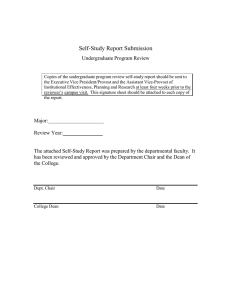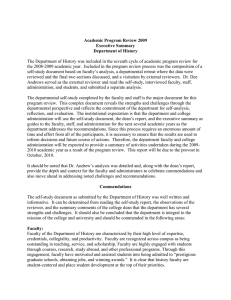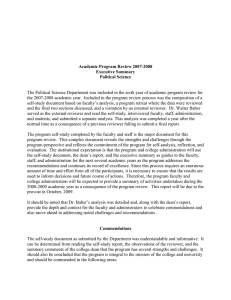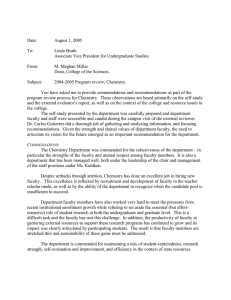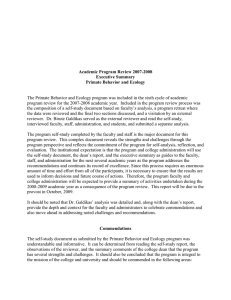Academic Program Review 2009 Executive Summary Department of Law and Justice
advertisement
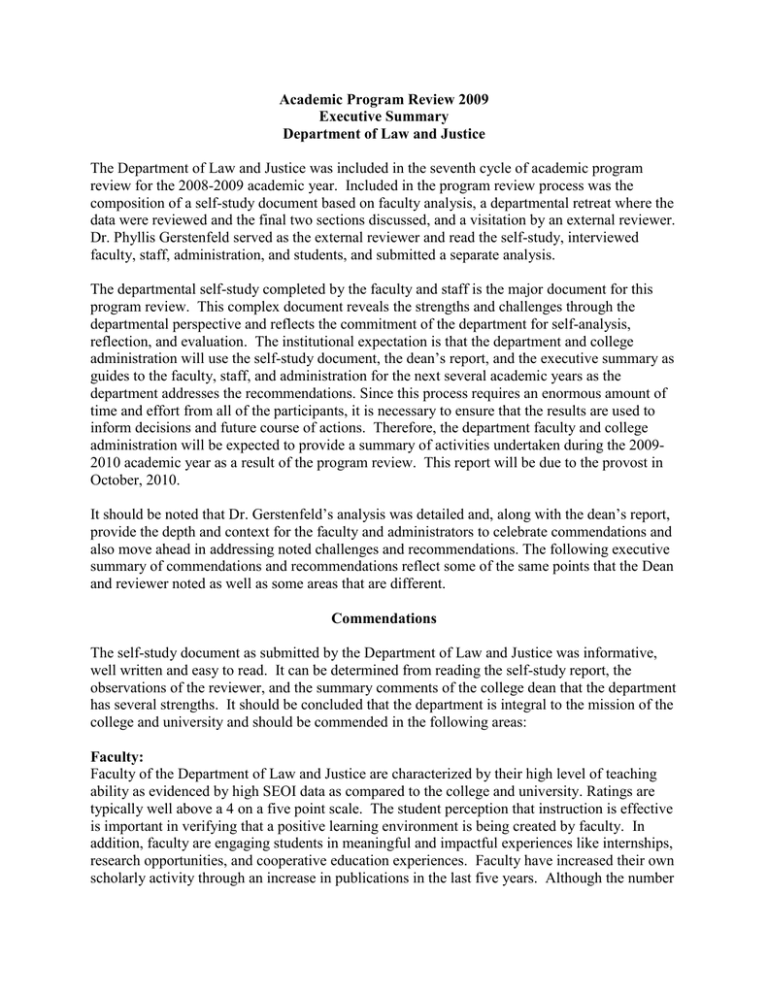
Academic Program Review 2009 Executive Summary Department of Law and Justice The Department of Law and Justice was included in the seventh cycle of academic program review for the 2008-2009 academic year. Included in the program review process was the composition of a self-study document based on faculty analysis, a departmental retreat where the data were reviewed and the final two sections discussed, and a visitation by an external reviewer. Dr. Phyllis Gerstenfeld served as the external reviewer and read the self-study, interviewed faculty, staff, administration, and students, and submitted a separate analysis. The departmental self-study completed by the faculty and staff is the major document for this program review. This complex document reveals the strengths and challenges through the departmental perspective and reflects the commitment of the department for self-analysis, reflection, and evaluation. The institutional expectation is that the department and college administration will use the self-study document, the dean’s report, and the executive summary as guides to the faculty, staff, and administration for the next several academic years as the department addresses the recommendations. Since this process requires an enormous amount of time and effort from all of the participants, it is necessary to ensure that the results are used to inform decisions and future course of actions. Therefore, the department faculty and college administration will be expected to provide a summary of activities undertaken during the 20092010 academic year as a result of the program review. This report will be due to the provost in October, 2010. It should be noted that Dr. Gerstenfeld’s analysis was detailed and, along with the dean’s report, provide the depth and context for the faculty and administrators to celebrate commendations and also move ahead in addressing noted challenges and recommendations. The following executive summary of commendations and recommendations reflect some of the same points that the Dean and reviewer noted as well as some areas that are different. Commendations The self-study document as submitted by the Department of Law and Justice was informative, well written and easy to read. It can be determined from reading the self-study report, the observations of the reviewer, and the summary comments of the college dean that the department has several strengths. It should be concluded that the department is integral to the mission of the college and university and should be commended in the following areas: Faculty: Faculty of the Department of Law and Justice are characterized by their high level of teaching ability as evidenced by high SEOI data as compared to the college and university. Ratings are typically well above a 4 on a five point scale. The student perception that instruction is effective is important in verifying that a positive learning environment is being created by faculty. In addition, faculty are engaging students in meaningful and impactful experiences like internships, research opportunities, and cooperative education experiences. Faculty have increased their own scholarly activity through an increase in publications in the last five years. Although the number of presentations and grants has not similarly increased, faculty involvement in service related activities has increased in professional leadership roles as well as internal and external committees. Assessment: The Law and Justice program has made significant progress in their development of an assessment plan, methods, and processes. Although progress needs to continue to improve efficiency and meaning, the program seems somewhat committed to following an appropriate assessment regimen. Technology Application: The use of current technologies (online courses, ITV) in its program is positive. It matches the needs of students that are place bound and/or have nontraditional schedules and needs. These methods also allow students to gain familiarity and skills that might serve them later in their profession. This may also improve students’ employability in the future. The idea of examining student perception and achievement differences by delivery mode is positive and should be implemented in future assessment cycles. Community Collaboration: The department should be commended for their involvement and effort in connecting with community partners and agencies. It is clear faculty think this is important and have made this a distinctive quality of the department. Recommendations Although the department should be commended in areas, there are also areas for improvement. Following are areas that should be addressed to improve the functioning and quality of the department and its associated programs: Enrollment Management: There is a need for the department to examine enrollment patterns at all locations and ascertain the reason for lower than average retention and graduation rates. Although the department cites internal competition with other degree offerings, there are clearly other reasons as well for these phenomena. Note that the program in Peirce is especially susceptible to low annual retention and graduation rates while having no other internal competing programs. With a Law and Justice program starting in Tacoma by the University of Washington, the addition of Social Services and Interdisciplinary Studies: Social Sciences, the department needs to determine the future viability of the site. Curriculum Planning: The department needs to develop and make known a long-term plan for course offerings at all program delivery locations. This will assist students and faculty alike as to planning and advising. Program Integrity: The program has made several curriculum changes that should assist it with regard to course substitutions, etc. This is positive. However, the department should immediately cease any further practice of wholesale waiving of prerequisites and other requirements to increase FTE, department revenue, and faculty income. This practice is not consistent with best practices or educationally defensible. Standards should indeed be constant unless changed for some educational reason. Assessment: Although developing, the department needs to put continued energy and focus in examining student learning and department goal-related achievement. Continued effort should be made in collecting, analyzing, and discussing assessment data. These processes should be firmly in place and effectively utilized during the time period before the next program review. Requests for resources (including equipment) can be driven by the types of data that could be collected through a systematic and ongoing assessment system. Assistance is available through the Office of Testing and Assessment and it should be sought. Advisory Committee Formation The department is encouraged to develop an advisory committee made up of various external partners and constituencies to obtain greater guidance with regard to curriculum and other programmatic matters. The benefits of utilizing such a committee is manifold and worth the time and effort of establishing. Summary Overall, the Department of Law and Justice is an important part of Central Washington University. Faculty are dedicated and involved and the department has made great progress in terms of assessing educational outcomes. However, by examining and improving its retention and graduation issues, assessment processes, and program planning and integrity, the department has great potential in achieving its goals and those of the college, and university.
